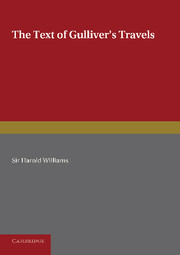II - Swift's Part in the Revision of the 1735 Text of Gulliver's Travels
Published online by Cambridge University Press: 05 June 2016
Summary
‘Gulliver vexeth me more than any’ wrote Swift at a time when he was contemplating the new edition of his collected Works projected by George Faulkner, the Dublin printer. Vexation still attends both the text of the book and its interpretation. With the interpretation of Gulliver, a problem neither textual nor bibliographical, we are not concerned. Whether in Lilliput the Minister Reldresal should be identified with Townshend, Stanhope, or Carteret; whether in the same part of the narrative Skyresh Bolgolam, ‘Admiral of the Realm’, who was pleased, ‘without any provocation’ to be Gulliver's ‘mortal enemy’, stood for the Earl of Nottingham or the Duke of Argyle; whether in the third part the ‘ great Lord, whose name was Munodi’, represents Midleton or Oxford; whether, or not, in the fourth voyage, Swift identified the Yahoos with mankind in general; whether the narrative is dictated by a despairing misanthropy, or whether its purport is to show to what excellencies man can reach if he will but be guided by reason; these questions do not here enter for discussion. In this lecture I wish to occupy myself, in the main and in broad outline, with the important question of the text of Gulliver's Travels. We know that Swift was exasperated, genuinely disturbed in mind, by the liberties Motte took with the manuscript, not merely because he disliked seeing his work exposed to the arbitrary mercies of an editor, but because the deletions and alterations distorted his intention and made nonsense of his meaning. We have already seen that he was particularly incensed by an alteration which represented him as declaring that Queen Anne governed without a First Minister, a statement which was ‘plainly false in Fact’. Further major alterations either removed altogether, or weakened, satirical passages reflecting on persons, politics, the law, and social life. These changes were, as we have seen, in the first instance adversely commented upon by Ford in his ‘List’, and later put to rights in his interleaved book.
There are three factors which have to be taken into account in any discussion of the text of Gulliver: (a) Ford's ‘List’; (b) his interleaved book; (c) Faulkner's edition of Gulliver.
- Type
- Chapter
- Information
- The Text of Gulliver's Travels , pp. 31 - 61Publisher: Cambridge University PressPrint publication year: 2013



